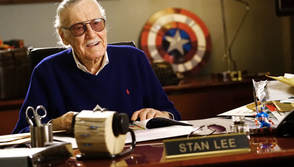 by Preston Tolliver Stan Lee died Monday at the age of 95. The father of Marvel comics (and arguably, all of comics), he gave us the Fantastic Four, Captain America, Spider-Man, the X-Men and countless unforgettable others (and a few forgettable ones, like Mangog or Gorgilla), but what’s more important than the characters he drew onto the page is the character he exhibited through his work and personality. Lee’s work didn’t just give children (and teenagers, and adults) superheroes to read about, whose powers some of us spent hours of each day daydreaming about (guilty as charged), but also gave us a blueprint for how to act toward others. What matters aren’t the color-coded, costumed characters that he brought to life panel-by-panel, but the messages he sent to young, impressionable minds through his works. X-Men wasn’t just about a ragtag, hormone-crazed group of gifted youngsters doing super-cool things to super-bad dudes, but was about racism and tolerance. Read “God Loves, Man Kills” and tell me that Rev. WIlliam Stryker isn’t a Marvel Universe version of David Duke, and his Purifiers a fantastical version of the Ku Klux Klan. Sure, there are the fun stories and arcs – the graphic novels we pen through to check out the art, the very-red panels of Deadpool cutting the heads off whoever while making fart and dick jokes – but when it came to Lee, there were often lines to read between. He had a habit of being simultaneously subtle and in-your-face. Lee’s comics featured villains in red capes and metal masks, but he also showed us what real evil looks like and how to fight against it. Lee – and Marvel, through his leadership and example – has also been a standard-bearer for progress during times where it was dangerous to do so. In July 1966, in the midst of the Civil Rights Movement, he and Jack Kirby introduced the world to the Black Panther, regarded as the world’s first black superhero. Such acts reverberate in today’s Marvel – we’ve seen female versions of popular heroes Thor and Iron Man; we’ve seen an increase in LGBT characters; we’ve seen African-American versions of Spider-Man and Captain America; and in the Marvel Cinematic Universe, Black Panther got his first full-length film, featuring an almost all-black cast, and led by black directors, writers and producers (Vox described the movie as a “groundbreaking celebration of black culture”), and next spring will see the release of Captain Marvel, starring Brie Larson in the titular role and featuring mostly-female writers. Marvel has long been at the front of the line in terms of social and cultural progress, and a lot of that can be attributed to Lee. For decades, Lee concluded his comics with a column titled “Stan’s Soapbox,” in which he would speak on current issues. It was here that he did some of his best work, showing through his words how to combat the world’s evils, without superpowers, but with grace and tenacity. One of his most insightful (and still relevant, unfortunately) was published in December 1968, almost 50 years to the date: “Let’s lay it right on the line. Bigotry and racism are among the deadliest social ills plaguing the world today. But, unlike a team of costumed supervillains, they can’t be halted with a punch in the snoot, or a zap from a ray gun. The only way to destroy them is to expose them – to reveal them for the insidious evils they really are. The bigot is an unreasoning hater – one who hates blindly, fanatically, indiscriminately. If his hang-up is black men, he hates ALL black men. If a redhead once offended him, he hates ALL redheads. If some foreigner beat him to a job, he’s down on ALL foreigners. He hates people he’s never seen – people he’s never known – with equal intensity – with equal venom. Now, we’re not trying to say it’s unreasonable for one human being to bug another. But, although anyone has the right to dislike another individual, it’s totally irrational, patently insane to condemn an entire race – to despise an entire nation – to vilify an entire religion. Sooner or later, we must learn to judge each other on our own merits. Sooner or later, if man is ever to be worthy of his destiny, we must fill our hearts with tolerance. For then, and only then, will we be truly worthy of the concept that man was created in the image of God – a God who calls us ALL – His children.” The conversation of what creators deserve credit for which characters, or whether Jack Kirby gets his due or if his spotlight was stolen by Lee is irrelevant today. Right now, we must judge Lee by his own merits, what he stood for and the values he aimed to instill in generations of young and impressionable readers. He gave voice and inspiration to would-be heroes of all ages, and though he introduced us to muscular characters who shot lasers out of their eyes or could lift and throw cars and trains or move buildings with their mind, he was always the unaccepting hero of his own story.
0 Comments
Leave a Reply. |
Archives
July 2024
|